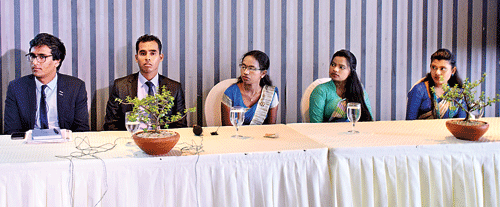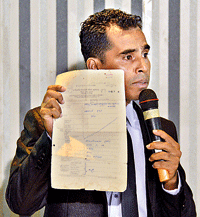18 and alone in the world

Speak out session- From L ot R- Senel Wanniarachchi (moderator), Akash, Sasika,Nimali and Iresha. Pix courtesy SOS CVSL
“My son is now 17. Will I give up on him next year just because he turns 18? I will support him probably till he is employed. If that is the case, how can we expect children in institutionalized care to transform themselves as adults overnight? Where can these children go? Who will support them?” asked Divakar Ratnadurai, Deputy National Director, SOS Children’s Villages Sri Lanka (SOS CVSL) setting the tone to the ‘18+ Building Support Systems for Youth Leaving Care’, an effort by the ‘Never Give up on a Child’ Advocacy programme of the SOS CVSL.
The event was held recently, to galvanize all stakeholders into finding solutions to the national issue of ‘care leavers’ (adolescents who are uprooted from alternative care placements such as children’s homes) and the Deputy National Director tapped the conscience of an entire nation.
The programme unfolded in the form of a ‘speak out’ session with four young people sharing their stories of emerging ‘somebodies’ from the package of ‘nobodies’ to the audience of policy-makers, legislators, corporate representatives, researchers, young leaders and media. The session was eloquently moderated by the recipient of the Queen’s Young Leaders award 2017 – Senel Wanniarachchi enabling a dialogue which celebrated the mettle of these young voice-makers despite social stigma, displacement and vulnerability.
Akash Moses, now a youth leader heading ‘Voice for the Voiceless Foundation’ committed to the cause of care leavers, Sasikala Sivarasa who is a Jaffna University undergraduate, Iresha Dilhani, a young entrepreneur with her own graphic designing and printing company and Nimali Tharu Kumari, a programme coordinator for Sarvodaya, armed with a first class degree in Journalism each with a different story to share, still wage the common battle of shedding the tag of a ‘care leaver’.

Akash Moses speaking at the programme
The domestic laws in our country require youth in child care institutions to leave their care homes and live independently as an adult by age 18. With almost zero networking opportunities and no proper life skills, these youth are unprepared for this transition. While this cross section of our youth population sadly remains ‘invisible’ to the public as well as the State – the ultimate custodian of children, the UN Guidelines for the Alternative Care of Children state otherwise. The Udayan Biennial Conference of 2016 held in India for improving standards of care for alternative child and youth care further reiterated the importance of ‘creating successful avenues for young people in transition to independence’.
Particularly in our setting, parental responsibility does not cease when a child turns 18 although children are legally deemed to be ‘adults’ by then. Given the social fabric of the country and the fact that higher education is pursued by most children, parents continue to support them through their years of education and even until children are given in marriage. Mental health issues, unemployment, delinquency and substance dependency are not uncommon among these youth who are forced to face the world alone. Worst, they could also become prey to sexual predators.
“Having left the care of a children’s home in Kandy at 18 with nobody to support me, I spent an entire night at the Goodshed bus stand in Kandy. While the others took their educational certificates for job interviews, I took my travel bag as I didn’t know where I was bound,” said Akash Moses, relating his story, just one among many. Despite Akash lobbying for a better life for thousands of ‘care leavers’ today, he continues to be disadvantaged due to his lack of a ‘proper’ Birth Certificate.
The absence of the Birth Certificate or an incomplete Birth Certificate often deprives care leavers of access to several mainstream services including employment, banking services and passports. This issue was taken up at the forum by the National Commissioner of Probation and Child Care Services, Chandima Sigera and Dr. Thusitha Wijemanna, Chairperson of Parliamentary Oversight Committee on Women and Gender.
Lending a voice for youth empowerment to the forum was the Chairman Vocational and Tertiary Education Commission (VTEC), Prof. Rajiva Wijesinha who articulated the need to heed the call of youth. “Giving opportunities to children to decide their future careers, with only proper guidance from adults is the want of the hour,” he said, reminding the audience that careers beyond the traditional framework are awaiting them today. The urgent need for competent counsellors, ideally equipped with NVQ qualification in the same was also highlighted by Prof. Wijesinha.
Setting an example of good practice of moulding ‘care leavers’ to face trials of life, SOS CVSL claims their own vocational training centres rend skills training and transitional homes which equip the youth with life skills. Iresha and Sasikala who were mentored by their ‘SOS families’ exemplify the ‘more fortunate’ care leavers whose life journey had taken a complete a different course thanks to the empowerment by SOS culture. “I was in a camp for the displaced when my mother decided that I would be better off at SOS CV and today I dream of becoming a teacher of mathematics,” beams Sasikala. Sharing similar sentiments, Iresha applauds her SOS family for giving her life skills and fostering confidence to brave the realities of adult life and being supportive of her chosen career path of graphic designing at a very tender age.
“We urge other institutions also to take a cue from us and develop a more youth friendly approach and thereby make the transition as a care leaver a smooth process,” noted Mr. Ratnadurai. The Ambassador of goodwill for SOS CVSL, star cricketer Roshan Mahanama urged more proactive political will to address this national cause. The event was also attended by Ministers Sudarshini Fernandopulle, Chandrani Bandara, Eran Wickramaratne and Human Rights Commissioner, Ambika Sathkunanathan.
Progressive recommendations for aftercare support by the SOS CVSL, formulated in partnership with several organizations committed to child care and professionals at the event were also tabled at the event. The proposal to develop youth services to plan the departure of the youth from care and prepare them for independent living, the establishment of a range of aftercare services including financial and networking support and a monitoring mechanism to ensure effective delivery, development of staff/carer capacity to better support youth in this transition, a system for information collection management and tracking the state of care leavers in the country and a resource centre which will act as a referral mechanism run by care leavers themselves were among them. The bold call for media organisations to be more proactive in addressing these causes of youth leaving care by Nimali Tharu Kumari who aspires to become a ‘the best crime reporter’ resonated the will of the youth to be a catalyst of change.
In line with these recommendations, a broad spectrum of steps were also presented through a policy brief encompassing amendments to the present law governing care leavers and offering job placements with the support of the private sector. These recommendations, as National Advisor-Advocacy, SOS CVSL, Chathuri Jayasooriya explained, are very much receptive to consolidation. “We welcome all stakeholders concerned with this national issue to join hands with us and share their expertise to further strengthen these recommendations and actions in the best interest of our youth.”
An ambitious and timely venture by the SOS CVSL, 18+ also set in motion the steps for a collective effort by all stakeholders to realize a State Policy for care leavers within which they become not just passive observers but active participants.


